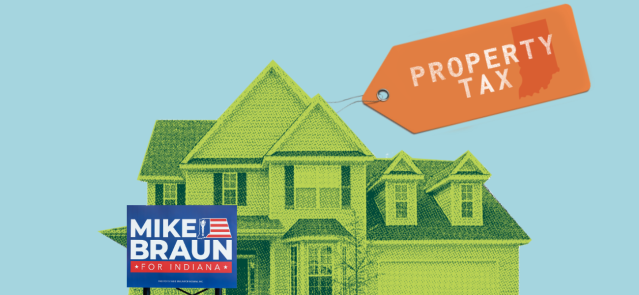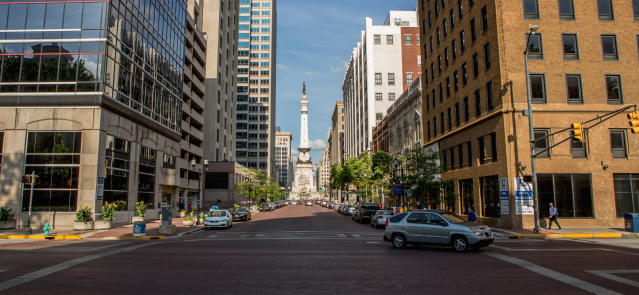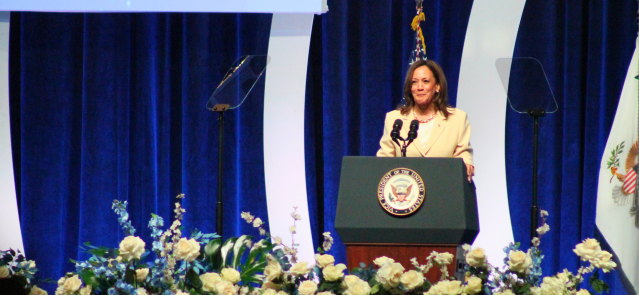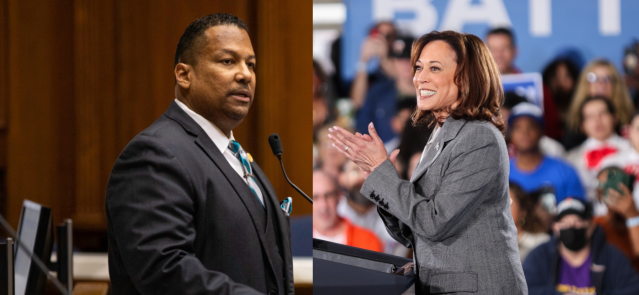Stay ahead of the curve as a political insider with deep policy analysis, daily briefings and policy-shaping tools.
Request a DemoIndiana abortions plummeted with ban in effect and ongoing court fight
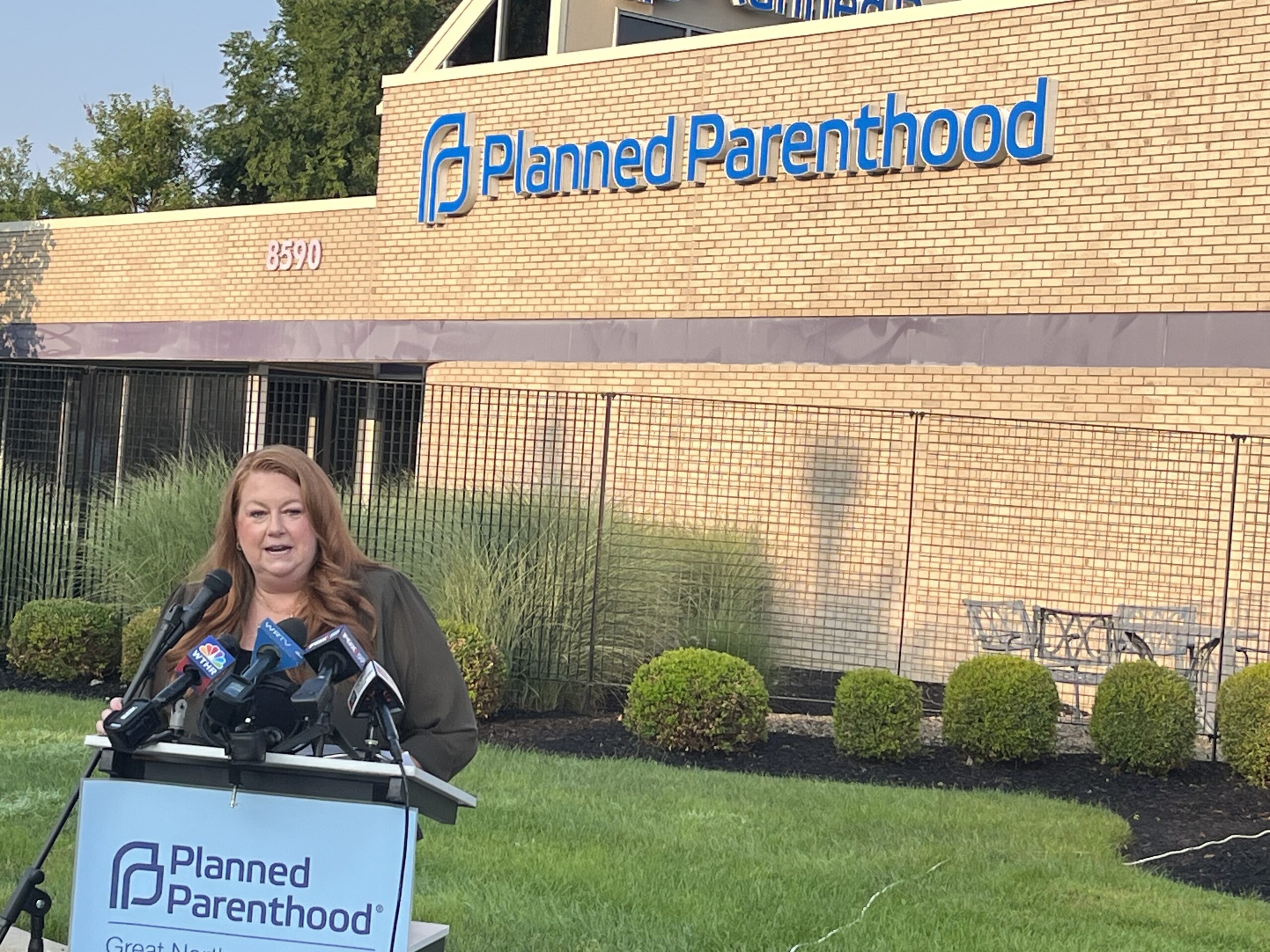
Rebecca Gibron, the CEO of Planned Parenthood’s Indiana affiliate, speaks during a news conference outside the organization’s northwest Indianapolis clinic on Aug. 1, 2023 (Credit: Tom Davies)
The Gist
Indiana doctors reported performing fewer than three abortions a week during the initial weeks after the state’s near-total abortion ban took effect.
Doctors reported 698 abortions during July, but that number plummeted once Indiana’s abortion clinics closed in August and the state Supreme Court lifted a lower court order that had blocked enforcement of the ban pushed into law by Republican legislators in 2022.
The Indiana Department of Heath’s latest quarterly report on abortions shows that 17 were performed under the ban’s limited exceptions between when the law took effect Aug. 21 and Sept. 30.
Abortion-rights supporters continue pursuing two court challenges to the ban — one of which is seeking to broaden the law’s health exceptions and allow abortion clinics to reopen in the state.
What’s Happening
The ban allows abortions only in cases of rape or incest before 10 weeks post-fertilization, or to protect the life and health of the mother or because of a lethal fetal anomaly up to 20 weeks of pregnancy. It also voided the state licenses of all Indiana abortion clinics, allowing abortions only in hospitals or hospital-owned surgery centers.
Of the 17 abortions performed after Aug. 21, nine were because of lethal fetal anomalies, health risks to the pregnant woman were cited for seven and one was due to rape or incest, according to the state report released Friday.
The state’s abortion clinics closed Aug. 1 amid legal uncertainty after the state Supreme Court rejected a lawsuit challenging the ban’s legality under the state constitution.
That led the number of abortions to drop from 698 during July to 52 in August and 14 during September.
The head of Indiana’s most-prominent anti-abortion group said the ban had prevented the state from becoming an “abortion-destination state” after tighter restrictions became law elsewhere.
“The new law that finally went into effect on Aug. 21 is doing exactly what it was intended to do, saving the lives of unborn babies by making abortion very rare and only for those exceptions written into law,” Indiana Right to Life President Mike Fichter said in a statement.
Why it Matters
Abortion-rights supporters have argued that the ban wrongly limits access to health care. They also maintained that abortion care would largely be unavailable outside Indianapolis even in situations meeting the limited exceptions, with the procedure no longer available at the six licensed abortion clinics.
The state abortion report shows that those clinics performed 94% of the 764 abortions during the July-September period.
Three Indianapolis hospitals were the site of 44 abortions during that time: Riley Health Maternity Tower (18), Indiana University Health University Hospital (15) and Eskenazi Hospital (11). Only one hospital-performed abortion was reported outside Indianapolis at Schneck Medical Center in Seymour.
Drug-induced abortions accounted for 27, or 60%, of those hospital procedures.
Planned Parenthood, which previously provided abortions at four Indiana clinics, said the state report showed the impact of religiously affiliated hospitals refusing to provide abortion services.
“Planned Parenthood providers would never turn their backs on any patient, and organizations that do shouldn’t be in the business of healthcare,” said Rebecca Gibron, the CEO of Planned Parenthood’s Indiana affiliate. “The data also demonstrates why exemptions don’t work and are good in name only. All patients should be able to access abortion, regardless of their circumstance.”
What’s Next
The American Civil Liberties Union of Indiana has two active lawsuits against the abortion ban’s limitations.
A challenge in a Monroe County court is looking to use an opening from the state Supreme Court in seeking to broaden health exceptions to the ban.
The Supreme Court’s decision last summer left unresolved how broad the health exceptions needed to be from the ban.
Chief Justice Lorreta Rush wrote in one opinion that she believed the state constitution “could protect a woman’s right to obtain an abortion under circumstances that extend beyond the current law.”
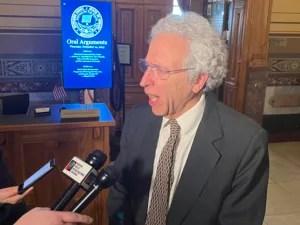
The American Civil Liberties Union argues the ban’s health exceptions are too narrow to abide by the constitution’s Article 1, Section 1 life and liberty protections and wants the courts to expand those exceptions to include mental health and other pregnancy-related health risks. It also wants a preliminary injunction lifting the ban on abortion clinic licenses.
“We’re litigating the question of what health is,” Ken Falk, the ACLU of Indiana’s legal director, said last month. “The current law states that a woman can get an abortion only if there is a situation where there is a severe and permanent impairment of a major bodily function, excluding mental health. That excludes all sorts of physical and, of course, all the mental health issues that can arise during pregnancy.”
Owen County Judge Kelsey Hanlon, who is special judge in the case, has scheduled a three-day bench trial to begin May 29 on the lawsuit.
The state Court of Appeals heard oral arguments Dec. 6 in a lawsuit filed by the ACLU arguing that the abortion ban violates the Religious Freedom Restoration Act signed into law by then-Gov. Mike Pence in 2015.
That lawsuit was filed on behalf of women who claimed the ban violates their religious rights on when they believe abortion is acceptable.
The panel of three judges considering the case have yet to release a decision, which will almost certainly be appealed to the state Supreme Court.
Tom Davies is a Statehouse reporter for State Affairs Pro Indiana. Reach him at [email protected] or on X at @TomDaviesIND.
X @StateAffairsIN
Facebook @stateaffairsin
Instagram @stateaffairsin
LinkedIn @stateaffairspro
4 things to know about Braun’s property tax proposal
Sen. Mike Braun, the Republican candidate for Indiana’s governor, released a plan for overhauling property taxes Friday morning that would impact millions of Hoosiers, Indiana schools and local governments. “Nothing is more important than ensuring Hoosiers can afford to live in their homes without being overburdened by rising property taxes driven by rapid inflation in …
Bureau of Motor Vehicles looks to add new rules to Indiana’s driving test
The Bureau of Motor Vehicles wants to amend Indiana’s driving skills test, putting “existing practice” into administrative rule. Indiana already fails drivers who speed, disobey traffic signals and don’t wear a seatbelt, among other violations. Yet the BMV is looking to make the state’s driving skills test more stringent. A proposed rule amendment looks to …
In Indianapolis, Harris says she’s fighting for America’s future
Vice President Kamala Harris, the presumptive Democratic presidential nominee, told a gathering of women of color in Indianapolis on Wednesday that she is fighting for America’s future. She contrasted her vision with another — one she said is “focused on the past.” “Across our nation, we are witnessing a full-on assault on hard-fought, hard-won freedoms …
Indiana Black Legislative Caucus endorses Harris, pledges future support
The Indiana Black Legislative Caucus unanimously voted Wednesday to endorse Vice President Kamala Harris’ presidential run and will look at ways to assist her candidacy, the caucus chair, state Rep. Earl Harris Jr., D-East Chicago, told State Affairs. The caucus is made up of 14 members of the Indiana General Assembly, all of whom are …

